The alumni recognized in the 2022 Aurum Awards include a chief, a judge, a survivor’s advocate, an architect, and a mental health care provider, but they are so much more than their professions. They are dedicated contributors to the social, cultural and economic well-being of society. We are proud to honour them.
.
SIDNEY PETERS
CREATING OPPORTUNITIES
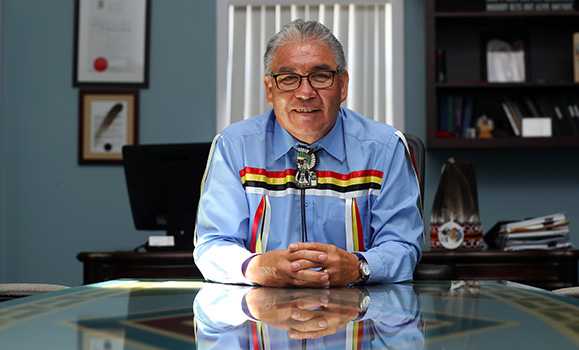
When Chief Sidney Peters (Dip Tech Agriculture’84) became the fourth chief of Nova Scotia’s Glooscap First Nation in 2012, the community was struggling with an aging population, limited economic prospects and negative media coverage of band remuneration. Drawing on his experience with Indigenous housing programs, he led the effort to rebuild the community’s fortunes and pride through new policies, housing and investments. Now, Chief Peters is setting his sights on a bold new goal for Glooscap: financial self-sufficiency.
What is the best advice you have to offer others?
“Someone once told me that you should surround yourself with good, positive people, because there is so much negativity out there. Also, you should understand how important family is. I don’t know how many times I thought about something that seemed complicated and after talking to my kids and hearing them say what was on their minds everything seemed simple.”
What do you enjoy most about your work?
“The feeling of providing a better community for people. The only way that I can do that is by creating opportunities for them. But one other thing I like about what I do is that every day is different. You never know what the next phone call might be or who will walk into your office. You could be dealing with politicians or helping families in need.”
What has been the most transformative experience in your journey?
“Gaining respect from individuals [who] you may not think are going to respect you. And the sense that you’re there to help not just one, but to help all. It’s all about all, for example, all First Nations, not just Glooscap. The opportunities that result from participating in so many different events and boards has been a real eye opener.”
GLORI MELDRUM
OFFERING SUPPORT
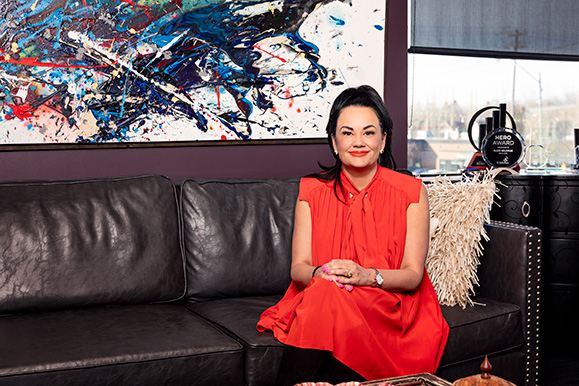
A survivor of child sexual abuse, Glori Meldrum (BComm’95) was determined to provide other survivors with something that was not readily available to her: support. Drawing on her resources as CEO of the Edmonton marketing agency g[squared], she founded Little Warriors, a national charitable organization focused on awareness, prevention and treatment of child sexual abuse. Her dream of opening a treatment centre for children who have been sexually abused became a reality with the creation of the Little Warriors Be Brave Ranch, a safe space of healing and support for children from across Canada who have been sexually abused.
What is your favourite advice to give others?
“I often say the beautifully broken—people who have been through trauma and are working on healing—are the ones who will change the world because of the empathy and compassion they’ve had to discover within themselves, often at a young age. They are the real game changers.”
What is the best part of what you do?
“The kids. They arrive at Be Brave with what I call ‘vacant eyes.’ They’ve experienced so much trauma. And when I come back for their grads a year later, they are smiling, they are more confident, and I can see their lives have changed. I didn’t get to go to a program like this, so being able to give them that one big gift of attending a world-class treatment centre is beyond words.”
What do you want to encourage in the community?
“That survivors stand up, if not for themselves, for the kids in their community. The statistics are that one in three girls and one in six boys is a survivor of child sexual abuse. But you don’t see one in three girls or one in six boys speak out when they’re adults. We shine light on darkness by using our voices as survivors. It’s the right and courageous thing to do so that other people know it is okay and so that the kids know that someone loves them.”
BRYAN LANGLANDS
WORKING GENEROUSLY
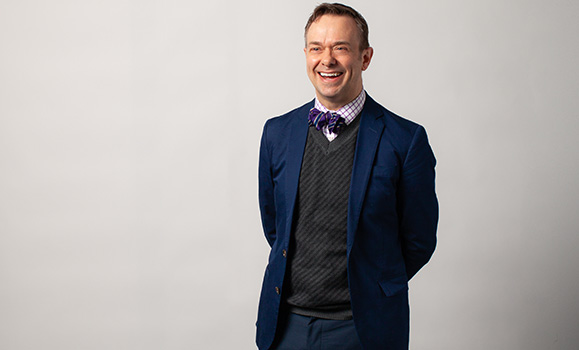
New York City-based architect Bryan Langlands (MArch’92) says he did not choose to specialize in health care—it chose him. And it became a way to fulfill a lifelong desire to make a difference. Through his unique approach to hospital planning and design, Langlands has helped improve patient care and staff well-being at some of the most prestigious medical centres in the United States. Through his involvement in several industry organizations, he is advancing the ever-evolving hospital design guidelines that are impacting the way health care is delivered nationwide.
What is the best advice you ever heard?
“The French architect Henri Ciriani once said that the beauty of Zaha Hadid’s architecture was, in part, its generosity. Let me explain. A doorway is functional. It’s a passageway. But an arch is more than functional. It is grander, it is larger, it expresses the structural forces applied to it and it has an inherent beauty. That is what I interpret as what he meant by ‘generosity.’�� I believe that when you look for moments of generosity in your work, you become more successful. I always look for ways to bring that into the design of hospitals. Generosity does not have to be a grand gesture, it can be as simple as placing a window at the end of a corridor, which lets daylight into the middle of a nursing unit.”
What do you enjoy most about your work?
“One is mentoring younger medical planners and sharing my passion for striking a balance between regulations and practice. The other is that through design and through shaping design regulations, I get to impact how health care is delivered across the country. That is incredible.”
What lesson did you learn the hard way?
“I stuttered as a child. It takes a lot of confidence-building to overcome the insecurities related to that. I don’t know if it is a lesson, but I think it is important to build confidence in yourself because as you do, it becomes self-sustaining.”
PATRICIA LINGLEY-POTTIE
PROMOTING WELLNESS
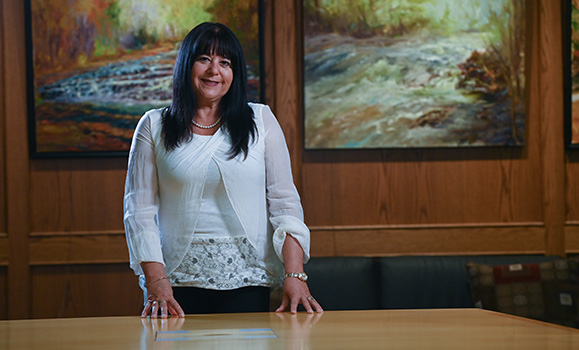
Knowing how vital mental health is to alleviating suffering and overall well-being, Halifax-based IWK Health Centre scientist Patricia Lingley-Pottie (BN’88, PhD’11) cofounded the Strongest Families Institute. It’s an award-winning non-profit that delivers evidence-based, bilingual telephone and virtual mental health and well-being services to children, youth, adults, military families and underserved populations. Under her leadership, Strongest Families has grown significantly; a team of 100 coaches and staff offers support to more than 13,000 Canadians annually.
What do you enjoy most about your work?
“The fact that I have been able to work with some great people to develop an innovative, scientifically proven and validated system of care that supports people of all ages across Canada. Making a difference in people’s lives has been a life-long passion of mine and I am driven every day to continue my dedication to improving mental health and well-being.”
What is the biggest professional challenge you face?
“The COVID pandemic. We adapted our programs to help our clients manage the impacts of the pandemic. We expanded demand for our services. We stepped up to help other mental health organizations get online. And we supported our staff who were also experiencing mental health impacts. It has been a disruptive and challenging time… Everyone should be encouraged to start a mental wellness routine. It is just as important as a physical wellness routine. A good way to get started is to take 10 minutes every day to do something you really enjoy.”
What lesson did you learn the hardway?
“Vulnerability. When I worked on my PhD, I met with my committee for the first time, which included colleagues I’ve worked with to develop Strongest Families. They treated me like a student, which they should have, but it took me by surprise. After taking a step back for self-reflection, I realized it is okay to be vulnerable when your role and relationship with others changes. And it is important to accept constructive feedback because that’s what makes us stronger and more driven to be successful, even as leaders.”
SHEILA RAY
STRENGTHENING COMMUNITIES
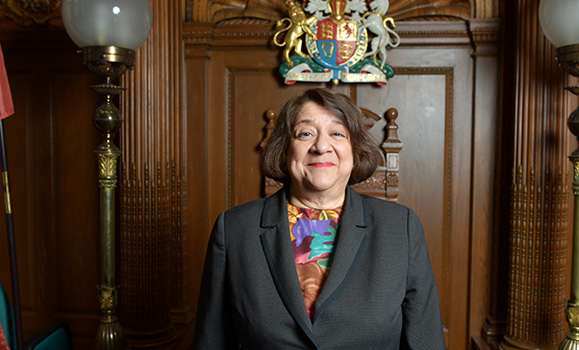
Watching her parents successfully overcome adversity and win respect, Justice Sheila Ray (BA’77, LLB’80) resolved to continue to break down barriers that prevent people from achieving their potential and contributing to their communities and society. As the first South Asian-Canadian woman appointed to the Ontario Court of Justice, she has made progress. Through her decisions, articles, speaking and volunteer activities, Justice Ray is not only reshaping the justice system but also strengthening communities, ensuring there is more fairness and support for those who experience adversity.
What is the best part of what you do?
“The opportunity to make a difference. That’s why I became a judge. It gives you many opportunities to do that, and not just in the court. For example, I volunteer, teach, write and am doing my PhD. I appreciate opportunities to learn, and I want to reciprocate. I want to help create a better experience for others.”
What do you want to encourage in the community?
“One thing I’d like to see is more public legal education. If you read a short article or hear a three-minute soundbite about a court decision, you might think it was inappropriate. But if you were in court, and you heard what the judge heard, you might reach the same decision. More public legal education encourages understanding about what the courts do and enhances confidence that justice is being administered fairly.”
What has been the most transformative experience in your life?
“I had an idyllic childhood growing up in Nigeria. But one day, there was tension in the air, and I was told, ‘You’re not going to school today.’ No one explained at first what was going on, but I eventually discovered there had been a military coup. My whole life changed. That experience taught me to enjoy what you have when you have it, because you could lose it in a day.”
��
THANK YOU to our community members who nominated an alum for an Aurum Award this year. The ���ϳԹ���Alumni Association Awards Committee once again found themselves with the wonderful problem of having an abundance of excellent nominations to review. Choosing five people to name as Aurum Award winners was not easy when so many were deserving.
It is always inspirational to learn more about our vast, global alumni community and to pause to consider the incredible and varied ways they are strengthening society. Their stories and their insights are the evidence that having dreams and living with purpose are fulfilling.
If you know an alumn who deserves to be recognized for their outstanding achievements and innovation; community engagement and leadership; and contributions to the social, cultural and economic well-being of society, take note: open on September 1, 2022.
��
This story appeared in the DAL Magazine Spring 2022 issue. Flip through the rest of the Spring 2022 issue using the links below.

